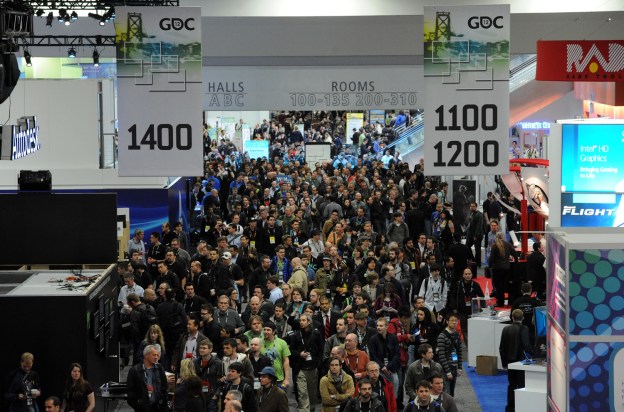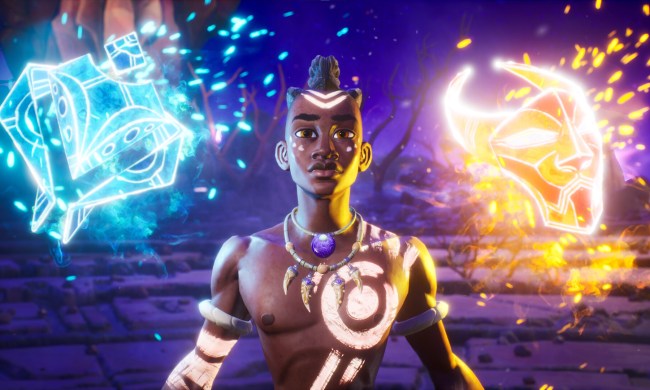 This Monday, the 26th annual Game Developers Conference kicks off in San Francisco. When it comes to gaming conferences, GDC is a bit difficult to define. As the name suggests, GDC is aimed primarily at developers, but as the show has grown, so too has its scope and importance. Last year more than 22,000 people attended the show, and this year should be the same if not bigger.
This Monday, the 26th annual Game Developers Conference kicks off in San Francisco. When it comes to gaming conferences, GDC is a bit difficult to define. As the name suggests, GDC is aimed primarily at developers, but as the show has grown, so too has its scope and importance. Last year more than 22,000 people attended the show, and this year should be the same if not bigger.
It doesn’t have the weight of E3, nor will it have the spectacle of PAX or Tokyo Game Show. And yet each year GDC seems to take on more significance. For developers it is a time to discuss what is coming, while looking back at what has been. For publishers, it is a time to hold meetings and recruit new talent. For PR, it is a time to show off new products that they don’t want to hold until E3. For press, it is a time of running from one event to another, frantically trying to find enough hours in the day to cover all the relevant news – so status quo for us.
This year is an important one for gaming, arguably one of the most important in the history of the industry. It’s a transitory time, not just because of the new consoles coming that will shape the face of the industry for the next 5 to 10 years, but for the emerging business models that will determine what keeps the market going. We’ve seen the rise of the mobile game from a side industry to a driving force in gaming. We’ve seen the birth of a new form of monetization with the expansion of free-to-play games. We’ve even seen microtransactions become a force, much to the delight of publishers like EA and the chagrin of many gamers. We’ll see more of all of that at this coming GDC, but there will also be something else in the air: anticipation.
Anticipating the next gen
Even though Sony dangled a tempting morsel in front of us in the guise of the PS4, the manufacturer held back a lot of the details that will define what makes the new system worth shelling out a fairly substantial wad of cash – including how big a wad of cash that may be. On the other hand, Microsoft has given us even less than that – although that hasn’t stopped us from making guesses offering our professional opinion.

But even though there is a lot the public don’t know about the next gen yet, there are many developers that have been working with the PS4 and next Xbox for months, even years now. They are under powerful gag orders though, and Sony and Microsoft’s team of ninja-like lawyers would have no qualms in crushing anyone that broke the NDAs they certainly signed. There will be hints, though.
While developers won’t be able to speak specifically about the next-gen beyond what has already been revealed, there will be hints to be gleaned indirectly. It will be a convention built around reading between the lines. It might be akin to staring at shadows, but those shadows can help us define the shape of what casts them.
One way to see that shadow will be through some of the new technology being discussed at the event. New graphic engines, AI programs, and the like may not tell us exactly how the next gen will react, but it will give us a good idea.
Games
GDC isn’t traditionally a time for game unveilings (with a few notable exceptions), but that doesn’t mean there won’t be some big gaming news to come from the show. Last year Medal of Honor: Warfighter was unveiled, while Battlefield 3 debuted at GDC the year before. Some of the games we can talk about, some we can’t (yet). Check back with us next week (and in at least one major case the week after) for the titles that are shown off at GDC.
Along with a handful of first-looks and actual debuts, there will also be several game demos, hands-ons, and previews. There are dozens of games due out between now and E3 in June, and GDC is the perfect time to show them off. Check back with us through the week as we preview several games that people will be talking about for the next few months, at least.
Getting gamers involved
User-generated content isn’t anything new, but there are more and more ways to get players involved in the games. Level-building tools, for example, are relatively common on PC and they are seeping into consoles more and more, allowing gamers to take some ownership of the games they love. The expansion of new technology makes that just one way out of many to engage gamers.

More and more games are also offering ways to share their gaming experiences with others. That may include new publishing tools to help gamers put out their own content, or other tools that allow fans to play games and broadcast that content to others. Services like Ustream and Twitch are building small empires around this technology, and the gaming industry is taking notice. The PS4 will even contain a “share” button to share gaming content.
Combining these methods with social networking, gamers will have more options than ever to connect and show the games that they are passionate about. GDC is the perfect place for innovations tailored to this mindset to be unveiled and celebrated.
Looking back to look forward
With this generation of consoles fading out, but replacements not yet firmly established, much of this GDC’s development sessions will be filled with discussion of how the previous generation handled issues, and how developers will adapt those lessons for the future.

The current generation of consoles pushed the technology in ways that no one could have imagined 10 years ago. The result is a new era in gaming, where the games are just one part of what a gaming system can be. This generation will likely be remember as the bridge between gaming consoles and entertainment systems, and those are lessons that we are still analyzing.
GDC 2013 will feature a good deal of analysis. Knowing how we got there will let us know where we can go.
More ways to play
Free-to-play games are an established field now, and it is just going to continue to grow. A few years ago these games were rare. Now most publishers are experimenting with the idea, trying to find a balance between getting their games out and finding a way to monetize them properly. In other words, free-to-play isn’t going anywhere, and this GDC will have more games of that ilk than ever before.

GDC 2013 will also continue to feature mobile and social network games. To complement that, we’ll see several tools debut that will help developers find new ways to publish their titles, and offer gamers more ways to play than ever before. While E3 is a place to debut games, GDC is a place to debut ideas.
The calm before the storm
This year’s E3 is going to be big. Really, really big. With the PS4 due out this holiday, and the next Xbox almost certainly to follow suit, plus the Wii U (hopefully) finding its stride and developers releasing more games for it, not to mention the continued growth of the Vita and 3DS, this should be one of the best E3s in history.
GDC 2013 will be the last major event before the storm. There will be plenty of news to come from the event, but there will be a palpable sense of anticipation in the air. After this show, everything will change.
Photos: GDC




